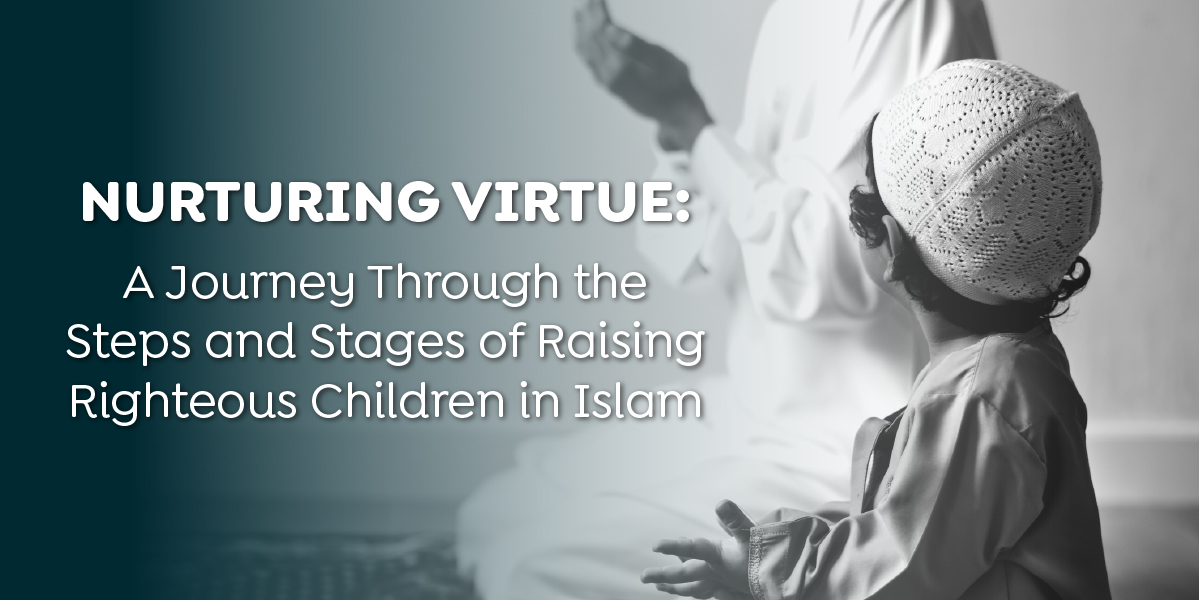Physical fitness and spiritual well-being is highly emphasised in Islamic faith, these two Islamic traditions encourage individuals to live a balanced and holistic lifestyle.
Introduction:
Raising righteous children is a profound responsibility and a noble endeavour in Islam. It involves a harmonious blend of nature and nurture, with parents playing a pivotal role in guiding their children toward virtue. In this blog, we explore the steps and stages involved in nurturing righteous children within the Islamic framework.
- Pre-Conception Dua and Intention
Before conception, Islamic faith encourages parents to pray (dua) to Allah for righteous offspring. Making a sincere intention to raise children who possess taqwa and are morally upright sets the foundation for a spiritual journey even before birth.
- Pregnancy and Positive Environment
During pregnancy, creating a positive and serene environment has a significant impact on the child’s development. Recitation of the Quran, listening to beneficial Islamic lectures, and engaging in dhikr (remembrance of Allah) contribute to a spiritually nurturing atmosphere.
- Embracing the Role of Role Models
Parents serve as the first and most influential role models for their children. Modelling righteous behaviour, kindness, and adherence to Islamic principles in daily life becomes a living example for children to emulate.
- Early Childhood: Instilling Love for Allah and His Messenger
In the early years, introduce children to the love of Allah and His Messenger, Prophet Muhammad, (peace be upon him). Bedtime stories about prophets, simple prayers, and interactive activities foster a connection with the Islamic faith from a young age. This also extends wider than the four walls within. Islam also teaches the importance of introducing children to the outdoors amidst nature.
- Teaching Moral Values Through Stories and Examples
Utilise Islamic stories and examples from the lives of prophets and companions to impart moral values. Narratives of kindness, honesty, and compassion become powerful tools for instilling virtue.
- Introducing Salah and Rituals
As children grow, gradually introduce them to the significance of Salah (prayer) and other Islamic rituals. Make these acts of worship enjoyable and educational, emphasising the importance of spiritual connection with Allah.
- Providing Islamic Education
Enrol children in Islamic schools or classes to supplement their secular education. This ensures they receive a comprehensive understanding of Islam, including Quranic studies, fiqh (jurisprudence), and the teachings of the Prophet (peace be upon him).
- Encouraging Critical Thinking and Understanding
As children enter adolescence, encourage them to question and understand the principles of Islam critically. Provide a space for open dialogue, addressing their inquiries with patience and wisdom, fostering a deeper connection with their faith.
- Fostering a Sense of Responsibility
Teach children the concept of accountability before Allah. Emphasise the importance of responsibility for their actions and decisions, instilling a sense of duty toward themselves, their families, and the broader community.
- Continuous Dua and Guidance
Throughout the stages of upbringing, parents are encouraged to consistently supplicate for the guidance, protection, and righteousness of their children. Seeking Allah’s help and guidance is a continuous aspect of the parenting journey.
Conclusion: A Holistic Approach to Raising Righteous Generations
The journey of raising righteous children in Islam is a holistic and continuous process. By merging nature and nurture, parents contribute to the spiritual, moral, and ethical development of their offspring. With supplication, positive role modelling, and a comprehensive Islamic education, parents play a vital role in shaping righteous generations who will, in turn, carry the torch of faith and virtue forward. May Allah grant parents the wisdom and strength to fulfil this noble responsibility with grace and success.






